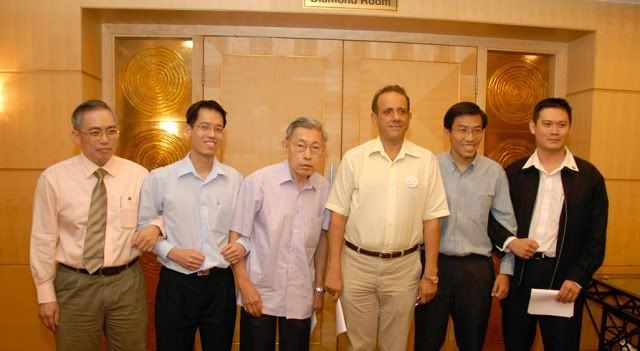This is a non-verbatim translation of a Lianhe Zaobao Op-Ed 《反对党何必高谈团结?》 dated 01 Jan 2011 by Yew Lun Tian.

Is Opposition unity an elusive target?
反对党领袖都认为只要能避免三角战,就算是达到反对党“团结”的目的了。
大选在即,去年无疑是政党活跃的一年。波东巴西第108座组屋楼下,上周沙爹飘香,原来是新加坡人民党按惯例,每年为党员及支持者举行的圣诞派对。不同的是这次有另两个政党的领导人受邀。
人民党秘书长、波东巴西区国会议员詹时中的妻子罗文丽在派对上讲话时,表示希望见到反对党更加团结。
詹时中一年前也喊出希望反对党能跟他团结对抗人民行动党的口号。他在纪念本身当选波东巴西区议员25年的晚宴上,慷慨激昂地对几乎到齐的反对党领袖高喊:“让波东巴西成为反对党争取更多胜利的政治支撑点和指路明灯!”
反对党的确需要团结,才能突破在国会只占两个议席的脆弱局面,而这也是一些希望见到国会更多元化的选民在对话会或互联网上频频发出的呼唤。
然而回顾过去一年,反对党的跨党合作局面却不免令这些人失望了。
首先,革新党与新加坡民主联盟的联姻几乎已胎死腹中。
詹时中是民联主席。他和罗文丽在前年6月找上革新党秘书长肯尼思,与对方密谈如何联手组成集选区团队。两人既然来自不同政党,要组成一支集选区竞选团队,就必须有个共同的平台。他于是邀请革新党加盟民联。
双方去年4月达成协议,肯尼思开出11项协议要点,包括民联得把秘书长或主席职位让给他坐,甚至希望民联考虑把名称改为“新加坡革新民主联盟”,以反映革新党不仅仅是民联的成员党,而是与民联享有平等地位。他还希望詹时中加入以革新党党员为主的集选区竞选团队,而自己则保留到单议席选区参选的权利。
这些协议要点把肯尼思想主导民联的野心暴露无遗,而詹时中为求与他合作也接受了,但是民联的其他成员党,即马来民族机构和新加坡正义党却无法接受。由三个成员党各派五名代表组成的民联中委会去年5月和11月在会议上两度推翻了詹时中要让革新党加盟的提议。肯尼思眼见加入无望,已公开表示放弃加盟。
他学历高,又是一度被视为反对党代表人物的已故工人党秘书长惹耶勒南的长子,加上革新党也吸引到政府奖学金得主陈礼添和潘群勤等条件不错的年轻人加入,若能和谐地与民联双剑合璧,相信能在来临的大选中形成一股不容忽视的反对党力量。
然而,争论至今的结果是民联非但没有壮大,反而还被分化。民联中委会决定孤立詹时中,并把他代表民联对外进行谈判或对外发言的权力转而托付于已被他视为眼中钉的秘书长林睦荃和马来民族机构秘书长莫哈默纳齐姆。
詹时中一心向着肯尼思,也间接导致他在人民党内部面临挑战。跟随他14年的林睦荃,就是因无法接受11项协议要点及其他原因,而和他决裂。就连20多年来对他不离不弃的党主席沈克栋,也疑因不满詹时中没为他向革新党争取在蔡厝港区参选的优先权,而向记者爆出他十多年来没遵守党章,把议员津贴的一成如数捐出。
令人觉得讽刺的是高喊反对党团结的人,正是过去一年传出最多对反对党合作不利消息的人。
本地反对党无法进行实质的合作,是长久以来的现象。它们的“合作”至今仅止于领袖们偶尔在周年晚宴上象征式拍张大合照。据熟悉反对党内幕的人说,平时各党都各自运作,没太多的互动。例如A党想派人到B党已表明要参选的选区走动,未必会事先照会B党。
新加坡民主党近年似乎已渐渐放弃了秘书长徐顺全博士一贯主张的不断冲击法律的非暴力公民抗命行动,还在过去三年召开促进反对党合作的论坛。革新党去年8月也尝试召开反对党圆桌讨论会,而林睦荃前月也说要邀请反对党领袖每个月碰面以共商策略。这些会议至今不是没能召开,就是出席率不高,无法达到实质的合作效果。
这多少反映出各政党在某种程度上仍对彼此心存芥蒂与猜疑,其中最刻意与其他反对党保持安全距离的是工人党。在没有反对党愿意或有足够的公信力去召集各党展开实质合作的情况下,诸如论政网站“网络公民”等相对中立的平台,就有了发挥角色的空间。它上月举办的一场对话会,就请到所有六个活跃的反对党派人参加。工人党虽然不是由秘书长刘程强或主席林瑞莲亲自出席,总算也派了个中委参加。这场对话会也引起论政网民关注,可容纳350人的会场几乎爆满。
“网络公民”的一个负责人受访时,也不讳言他有意把这个网站打造成反对党政治的“造王者”。
他说:“我们的目的是让凡是想在反对党圈子发挥影响力的人,都免不了要透过我们的平台去与网民接触。”
一名与会的前反对党候选人则在网上感叹反对党如今仍是一盘散沙。
“现在的局面如同许多卖同样东西的小型杂货店在跟高效益的霸级市场竞争。它们不想集合资源,以争取达到规模经济效益,而是一边比赛斗巨人,一边排挤其他杂货店。结果是霸级市场变得更强大,杂货店变得更薄弱。”
受访的反对党领袖都认为只要能避免三角战,就算是达到反对党“团结”的目的了,没必要在其他方面进一步协调。
一个反对党的秘书长说:“如果每个政党所提出的替代政策都一样,那跟行动党的‘一言堂’没分别,选民也就没得选择。”
现在流行的一种说法是反对党谈团结,目前还不是时候。只有当各政党都至少有一名候选人当选进入国会,才能构建平等的合作关系。
熟悉民联运作的政党领袖说:“当有议员的政党和没议员的政党谈合作时,前者可开口要求后者付出很多,还想不劳而获,但后者所能得到的却很少。这是民联这个合作平台不尽理想之处。”
一名政党政治观察者对此也有同感。
“哪个反对党夺得最多议席,其他反对党的领袖、党员或支持者就会转向那个政党,使它壮大。政党政治跟商业一样,玩的是弱肉强食的游戏规则。”
另有一种说法是反对党团结与否并不重要,选民对执政党的政策满不满意,才是决定选举结果的关键。
总而言之,或许各反对党未来能做的是少喊团结口号,多巩固党内实力。
—
Translated by Donaldson Tan
According to Opposition leaders, opposition unity is considered achieved if three-cornered fights are avoided during General Election (GE). With GE looming in the background, it is hardly a surprise the 2010 was an active year for various political parties in Singapore. Even the Singapore People’s Party (SPP) invited 2 other political parties to its annual Christmas Party that was held at Potong Pasir Block 108 last week. The SPP organises this Christmas party every year for its members and supporters.
During the Christmas Party, Madam Lina Luo expressed her hope for more Opposition unity. Madam Luo is the wife of Mr Chiam See Tong, SPP Secretary-General and Member of Parliament for Potong Pasir. A year ago, Mr Chiam See Tong made the same call for Opposition unity. During a dinner marking his 25 years as the MP for Potong Pasir, he proclaimed: ‘Let Potong Pasir be a power base and a beacon for more Opposition victories’
In order to improve the current delicate situation of having 2 Opposition MPs in Parliament, the Opposition political parties have to unite. Such calls have been echoed by concerned netizens and constituents at dialogue sessions who want to see a more diversified Parliament composition. However, looking back into 2010, the lack of progress in cooperation among opposition political partieis has been rather disappointing.
Firstly, the move for Reform Party (RP) to join the Singapore Democratic Alliance (SDA) has come to an abrupt end. Last June, Mr & Mrs Chiam See Tong approached the RP Secretary-General Kenneth Jeyaretnam secretly to discuss how to form a joint GRC team. Since the GRC team members must contest under the same banner, Mr Chiam invited RP to join SDA. Last April, both parties agreed to the 11 points proposed by Mr Jeyaretnam. The 11 points include Mr Jeyaretnam becoming the Chair or Secretary-General of the SDA, renaming SDA to the “Singapore Reform Democratic Alliance” in order reflect RP’s equal standing with SDA and Mr Chiam See Tong contesting under a RP-dominated GRC team while Mr Jeyaretnam retaining the option of contesting a SMC himself.
Although the 11 points reveal Mr Jeyaretnam’s ambition to seize leadership of the SDA, Mr Chiam accepted these 11 points so as to cement cooperation with Mr Jeyaretnam. However, the other 2 component parties of the SDA objected the 11 points. The other 2 component parties are the Singapore Malay National Organisation (PKMS) and the Singapore Justice Party (SJP). They objected RP’s entry into the SDA at 2 SDA Supreme Executive Council meetings which were held in May and November 2010. Seeing no hope of entering the SDA, Mr Jeyaretnam publicly announced the withdrawal of RP’s application into the SDA.
Mr Kenneth Jeyaretnam is not only highly educated, but is also widely regarded as the successor to the legacy of former Workers’ Party Secretary-General Joshua Benjamin Jeyaretnam’s legacy, being his eldest son. At the same time, RP has attracted former government scholars Mr Tony Tan Lay Thiam, Madam Hazel Poa and other young promising members into its ranks. If RP were to join SDA, it is possible for the SDA to become a force to be reckoned with.
However, the deliberation process on RP’s entry in the SDA has not only failed to strengthen the SDA, but also has weakened the SDA considerably. The SDA Supreme Executive Council has not only curtailed Mr Chiam’s privileges as Chairman to negotiate and speak for the SDA, it also transferred these privileges to his nemesis SDA Secretary-General Mr Desmond Lim and the PKMS Secretary-General Mr Mohd Nazem Suki.
Mr Chiam also faces internal challenges within the SPP for siding with Mr Jeyaretnam. For example, former SPP Assistant Secretary-General Mr Desmond Lim, who followed Mr Chiam for 14 years, challenged Mr Chiam’s leadership because he found the 11 points unacceptable. Even SPP Chairman Mr Sin Kek Tong, who has followed Mr Chiam for more than 20 years, spilled the beans on Mr Chiam allocating less than 10% of his MP allowance, the quantum required by the SPP Constitution, to the party coffer for more than 10 years. It is believed that Mr Sin is unhappy with Mr Chiam for failing to secure Mr Sin’s interest to contest Choa Chu Kang SMC as one of the collaboration terms with RP so as to avoid a three-cornered fight with PAP and RP at Choa Chu Kang.
It is ironic that the people who shouted the largest for Opposition unity were also the same newsmakers responsible for damaging the unity cause in 2010. The lack of cooperation among Opposition political parties is a long-time phenomena. Till today, their “cooperation” is limited to posing for photographs together at anniversary dinners and other public events. Sources within the Opposition say that each political party operates on its own, hardly any cooperation. For example, if Political Party A conducts a walkabout in a constituency already targeted by Political Party B, A would not inform B of its intentions.
On the other hand, the Singapore Democratic Party (SDP) has not only convened a roundtable on opposition unity in March 2010, it has also gradually lessened its civil disobedience campaigns. RP also attempted to initiate such talks last August while Mr Desmond Lim told Zaobao last month he would like to organise monthly meetings with opposition party leaders to discuss political strategies. It is not difficult to initiate such meetings, but these meetings remain ineffective as long as attendance is low.
The low attendance reflects the suspicion and grudges among political parties, with the Workers’ Party (WP) most actively distancing itself from other opposition political parties. In the absence of political parties with sufficient credibility to convene a meeting involving every opposition political party, there is political space for socio-political websites such as The Online Citizen (TOC) to organise public multi-party dialogues.
Last month, all 6 opposition political parties responded to TOC’s invitation to participate at its inaugural Face-to-Face Forum. Although the Worker’s Party wasn’t represented by Secretary-General Low Thia Khiang or Chairman Sylvia Lim, it was still represented by a member of the WP Central Executive Committee. The forum was almost full-house with an attendance strength of 350. A TOC spokesperson didn’t mince his words on the intention to turn TOC into the “kingmaker” of the Opposition. “It is our intention to promote TOC as the defacto online platform for the Opposition to engage netizens,” he said.
A former Opposition GE candidate commented that the Opposition parties today is still in a mess. “The current situation is like many small provision shops competing against one another and supermarkets. They don’t want to share resources so as to achieve economies of scale. As a result, the supermarkets become stronger while the small provision shops become weaker,” he said.
Opposition leaders who were interviewed said that opposition unity is considered achieved if three-cornered fights are avoided during GE and there is no need for further collaboration. One secretary-general of an opposition political party said: “if every opposition political party makes the same alternative policy proposal, then there is no difference from the lack of diversity in opinions in Parliament. Such a predicament means voters have no options to choose from.”
There is a popular theory that states until every opposition political party has at least one Member of Parliament, then they can cooperate with each other on equal footing. Hence, now is not the time for Opposition unity. A person familiar with the SDA leadership said: “When a MP-less political party collaborate with another political party that has representation in Parliament, the former can make a lot of requests and gain a lot for doing nothing. This is why SDA is not the ideal platform for collaboration.”
Another political observer shares the same sentiment. “The opposition political party with the most seats in parliament will attract leaders, members and supporters of other opposition political parties. Politics is like the commercial marketplace where the strong devours the weak,” he said.
However, an opposing argument claims that opposition unity is not as important as the electorate’s unhappiness with PAP’s public policies. The electorate’s unhappiness is most crucial for determining the outcome of the General Election.
In either case, it is better for opposition political parties to consolidate their party strengths and stop shouting sound bites proclaiming opposition unity.


Tks once again, Donaldson, for the translation!
The ZB reporter used the phrase “项协议要点” which I believe translates to “points of agreement”.
They should NOT be treated as such since CST was not in a legal position to AGREE on behalf of SDA with RP. This was subsequently validated when CST tried to obtain SDA SEC’s approval, and was rudely rebuffed.
I have always called them conditions imposed by RP because they were almost wholly biased towards it. I wrote about the main pre-conditions here:
http://www.facebook.com/notes/bryan-ti/rp-sda-merger-rps-condition-nos-2-5-and-10/433209443976
http://www.facebook.com/notes/bryan-ti/rp-sda-merger-rps-condition-no-4/432773958976
As for Opposition unity, or rather disunity, I wrote about it here:
http://www.facebook.com/note.php?note_id=430606313976
Donaldson,
Appreciate your efforts
Shin Leong
“协议要点” translates as key points of cooperation. “项” just means number.